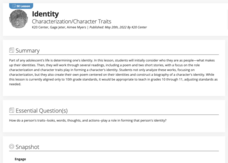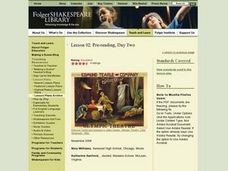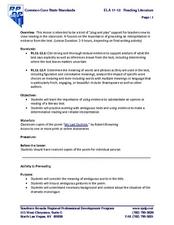K20 LEARN
Between The Lines: Inferences In The Narrative Life Of Frederick Douglass Excerpt
Good literature can be much like an iceberg requiring readers to presume that the bulk of the meaning may be inferred to be found below the surface. Here's a lesson that asks scholars to conduct a close reading of passages from The...
What So Proudly We Hail
A Lesson on Benjamin Franklin’s “Project for Moral Perfection”
Benjamin Franklin identified 13 virtues that he felt would strengthen his character if he could focus on each one. A thorough lesson explores high schoolers' personal values in the context of their lives, and compels them to strive for...
Curated OER
Mini-Lesson: Planning for Inferences
The five lessons in this resource are designed to teach class members how to read between the lines, how to use personal experience/background knowledge/schema, along with the information in the text, to make assumptions about what is...
CPALMS
Analyzing Vonnegut's View of the Future and His Commentary on the Present in Harrison Bergeron
Kurt Vonnegut's short story "Harrison Bergeron" engages adolescents with its theme about the dangers of complete societal equality. Learners complete a graphic organizer to track literary elements in the story, as well as an inference...
Curated OER
Analyzing Atmosphere: Macbeth Murder Scene and Dagger Speech
Shakespeare's Macbeth (Act II, Scenes I and II) lacks explicit details of the murder of King Duncan, yet the author creates an atmosphere that allows us to visualize the event. Readers interpret the "Dagger Speech" by writing stage...
K20 LEARN
I Theme, You Theme, We All Theme For Ice Cream: Themes In Literature
Teach readers how to distinguish between a topic and a story's theme in a short lesson that uses the children's book, Should I Share My Ice Cream, as an exemplar. After listening to the story, pairs generate a list of topics covered in...
Institute for the Professional Development of Adult Educators
Using Context Clues with Signal Words
When you come across an unfamiliar word in a text, do you skip it and move on? Practice using context clues to identify words you don't know with a thorough set of language arts lessons. The resource reinforces close reading and critical...
Curated OER
Using Pre-reading Strategies: Infer
Use this resource to support your class practicing inference with poetry and visual art. The plan calls for an examination of "The Scream" by Edvard Munch and the "Mona Lisa" to promote speculation about artist's intent. From there, it...
Curated OER
Poetry: An investigation of Life
AP English Language and Composition requires that class members be able to formulate an argument and support it. Use this resource to focus on the life of Emily Dickinson. It requires individuals to research her life and make inferences...
Curated OER
During Reading Strategies (Inferring)
Students practice their reading skills. In this reading fluency and comprehension instructional activity, students read instructor-selected passages and use metacognitive skills to make inferences based on the selections.
K20 LEARN
The History of Spoken Word Poetry: Historical and Cultural Perspectives In Literature
Spoken word poetry, more than almost any other form, reveals the historical and cultural perspective of the poet. High schoolers listen to various spoken word poems, select one to research in-depth, and then apply what they have learned...
K20 LEARN
Identity: Characterization/Character Traits
"Who am I?" Guy de Maupassant's short story "The Necklace," Julio Naboa Polanco's poem "Identity," and a clip from a Jason Bourne film provide learners with a context to consider the traits that makeup identity. Scholars create a...
National Endowment for the Humanities
Societal Schisms and Divisions
The final lesson plan in the Crime and Punishment unit looks at the societal injustices depicted in Dostoyevsky's novel. Scholars examine the schisms between men and women, between wealth and poverty, between religion and skepticism, and...
Curated OER
Inference Lesson Plan
Young scholars practice assessing graphics to infer and identify an author's implicit and explicit meaning in a piece of text. They evaluate the effectiveness of information found in maps, charts, tables, graphs, diagrams, cutaways and...
Curated OER
Shakespeare: Julius Caesar
Before your high schoolers read Julius Caesar, have them complete this thought-provoking activity! To familiarize them with some of the play's most important lines, break the class into pairs and have them create a skit around two lines...
Curated OER
Abigail Adams and Thomas Jefferson
In addition to her letters to her husband, family members, and friends, Abigail Adams also wrote to key political figures of the time. In this lesson, scholars examine letters Adams' wrote to and received letters from Thomas Jefferson...
Texas Education Agency (TEA)
Distinguishing Between Inductive and Deductive Reasoning (English III Reading)
Is Sherlock Holmes an inductivist or a deductivist? Users of this interactive to distinguish between inductive and deductive reasoning. They consider in various situations whether it is better to list evidence and then introduce a claim...
PBS
Does Art Imitate Life?
Write what you know, sound advice for any writer and something many famous authors are known to have done. Use these materials to explore how Shakespeare's life influenced his plays. This resource is packed with readings, video segments,...
Academy of American Poets
Teach This Poem: "In the Next Galaxy" by Ruth Stone
Imagine what life might be like in a different galaxy. That's the challenge young scientists take on in a warm-up activity designed to prepare them for a close reading of Ruth Stone's poem "In the Next Galaxy." After class members share...
Star Wars in the Classroom
"Shakespeare and Star Wars": Lesson Plan Days 13 and 14
How important are sound effects in films? In stage plays? In radio programs? To gain an understanding of the impact of these special effects, class members watch a short video spoof of the sound in a scene from Star Wars: A New...
Curated OER
The Language of Our World
Pupils make inferences about characters in poetry. In this literature lesson, students read poetry and prose to determine how characters handle conflict in each of the genres.
National Endowment for the Humanities
In Emily Dickinson's Own Words: Letters and Poems
Analyze the depth and beauty of American Literature by reading Emily Dickinson's letters and poems. The class analyzes Dickinson's poetic style and discusses Thomas Wentworth Higginson's editorial relationship with Dickinson. They pay...
Curated OER
Inside the Mind of the Unreliable Narrator
Create interdisciplinary connections and promote high-level inferences by studying unreliable narrators.
Southern Nevada Regional Professional Development Program
Reading Literature - My Last Dutchess
Draw back the curtain, add a spot of joy to your class, and let learners be instructional activityed by a close reading exercise that models how to develop an interpretation based on evidence drawn from a text. Robert Browning’s dramatic...

























